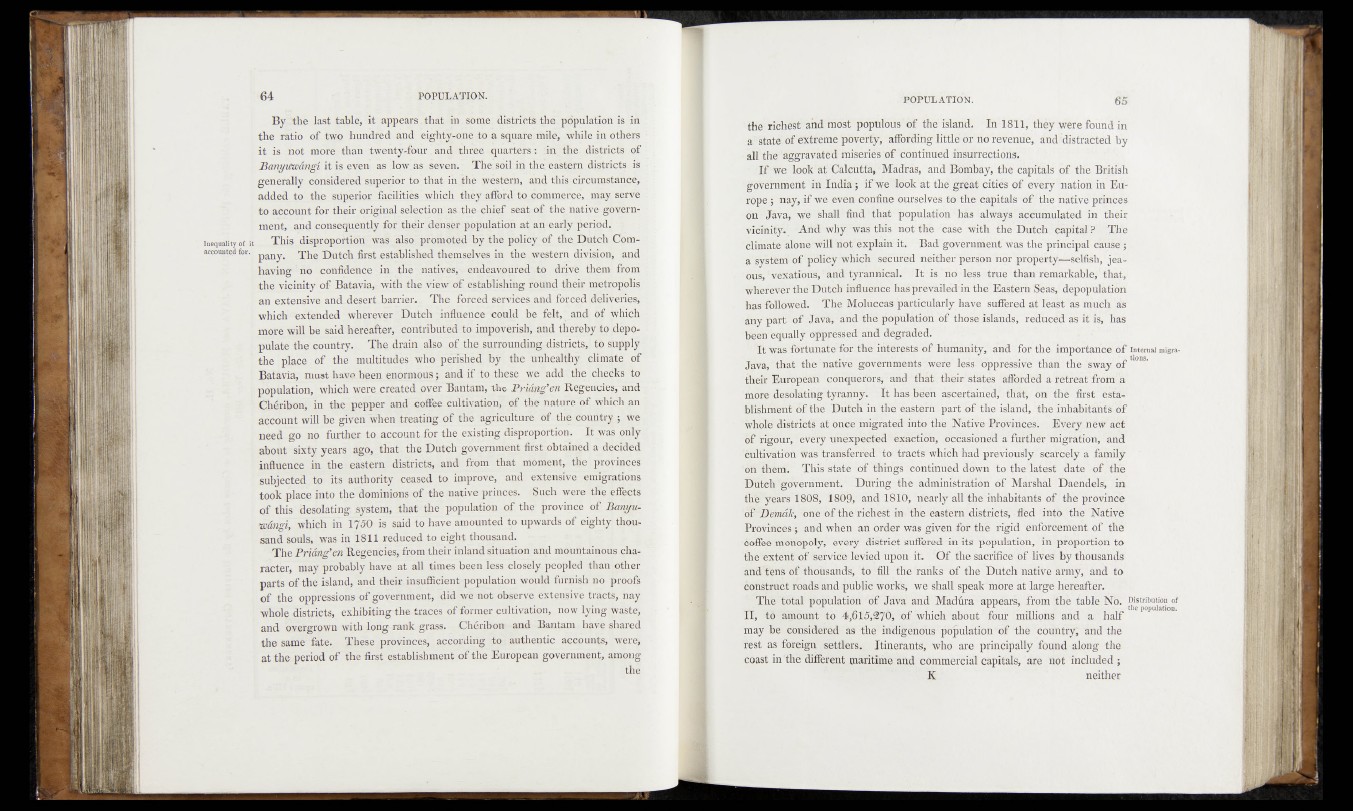
By The last table, it appears. that in. some, districts the population is in
the ratio of two hundred and eighth-one to a square mile, while in others
it is not more-than twenty-four. and three-quarters.: :in^ the. districts i f
Banyvxoangl i t is even; as,low. as seven. The;soil'in the: eastern districts is
generally considered superior to.that-in.the western, a.nd this.circumstance,
added to the superior facilities' which they afford- to^commerce*, may sgrve
to account for their original selecfcion\as-the chief seat-pfe the^natiye- government,
and consequently for their' denser population at an early period.
This disproportion^ was plso^promoted by the policy of tfee Dutch Company.
The Dutch, first .established themselves in the., western division, [and
having' no confidence in the natives,-, endeavoured'to drive them from
the vicinity of Batavia,- with the view of establishing round their metropolis
an extensive and.desert barrier.. The forced services, and forced Idmiyeriesj
which 'extended wherever '"Dutch influence co.uld he felt,’ and^ bf which
more_w_ill,be said hereafter, contributed^© impoverish, and thereby.)oidepo-
pulate the country. The drain also .qf_th,e,surrounding- districts,! to supply’
the pkce of the multitudes who perished by l the ^unhealthy climate o f
Batavia, mnat have been enormou s; and-if to-these wegad d jthe! Gheffif ’to
population, (which were_.created.j>ver’Bantam, the Pri-mg’en Regencies, und
Cheribonj ln the .pepper and coffee cultivation}; o f thejnatummf. which ;an
account will be ^v en when 'treating of the ag ficultufe^f' tlie country.
need go np further to.„account,fpr the existing disprppprtion. It was only
about sixty years, ago, that the Dutckgovernment fifsrtobtainedl a-.decfd|’d
influence in jh e jeastem districts, arid fJom that moment, it&e; provinces'
suh|ecteirtg its authority ceased to improve,, “and ^x teri«\^efc^mferi§
took .place into the dominions of the -native' princes, ?Su.ch were^b^^ffigts
of this' desolating, .system, that 'the population pf tl^^ ro v ip p e jol
wangi,"which in .1750 is said to have amounted to upwards of eighty!t|ouj
sand souls', .was in 1811 reduced to eight thousand. -
' T he Pricing’en Regencies, from their'inland situation and moun tmnfeus,character,
mE^ probably have at all times been less closely-people<T-tfianiotibier
parts of the-island, and thek- insufficienfpopulation would furnish no proofs
of the oppressions,of government, did we not observe extensive tracts, nay
whole “districts, exhibitingrthe traces of former cultivation, now lying,'waste,
and overgrown with long- rank grass. Cheribon and Bantam have shared
the same fate. These provinces;, accosting to-, authentic account^, .were*
at the .period' o f’the first establishment o fth e European government} among
the
' the richest- and most ‘ populous ' of the’ island. In 1811, they were found in
a’ statetof extreme'poverty, affording little'óri no revenue, and 'distracted by
all the'(aggravated miseries'of’Continued insurrections.
I f -we 'look'à f’Calcutta, 'Madras, !a'nd Bônàbay, the capitals of the British
gövérhment in India ;; |f ’we Took' at the great' cities of every nation in Europe
; n'ay, if we even; confine ourselves to 1 the capitals of ' itHe native''princes
óri"'-Java, we shall find that population'has always* accumulated in their
' vi'efhiipf And why '' was' this ' notrthe ‘case.'with. the- Du tch ; capital ?• ^ The
' climate'alönè'will hbffexplain it. Bad gqvèrnmentwas’tîiè principal clause";
a ‘system?ofTolicÿfwhich ‘secured neither'persou nor property—selfish/jeà- ‘ 1
' oÙs^vë^tiçMi^ndTyrannical. I t is ?no 'less-rtrue than remarkable,1 that,
^^ffefëverithe^Dûtch-irifluènce has prevaile'd-in the Eastern'Séâs/ depopulation
has follbwed. i'The Moluccas particularly have sü^erpd à t least as much as
any'part WiJâ’va, ‘and the population óf 'thbse1 islands, reduced? as it is, has
: ^eh^h^ally^d^^fdssed ‘ and degraded.
It was'lirtutiate'fdöh'e'interests of humanity, and for the importance of internal migra-
Java, that'-; the'native governments-[were less “oppressive than the/sway'of
' th"efrfÉuropëah1 îç^^uél^Jrs;" and *that'., their states ’afforded a fetreaffrom a
'more* de^ôlâtirig tyranny. It has been ascertained/-that; on' thé ?prat estW ~
blisHmeht^fij^^Mütch in.ThVbasterrï '.part of the island, ‘the inhabitants, of
districts atti)mf?£'migrated"into*the Natiÿé-Provinces. Every new'act
■§f rigour,''evëry nnexp'ecfed.- exactiori, pcóó&ioried'h further migration, and
cultivation was"’transferred1.rto'tracts which had préwpuslyi sea|3æly a family
‘éffthèm. 1 Thijs ’state o f ‘things Continued down toJthëLlàtest daté 'óf. the
Dutch'^OTêrüm,cht.'J :/Difôigi the administration óf Marshal Daendels, in
tlP^yearsHfeoS* 1809," andtiïSlt), -'itearly all the inhabitants of,;the province
‘mfDemaJc, ohetfif thefficHÓSt in- the eastern districts, -fifed tinto the Native
Provinces-; and when an order was given for this rigid enforcement'öf thfe
-"dOTe^Smbhopoly,-'every district suffered-inTtS' population, ‘in proportion to
îftmî^extent'ôffserviefetievied iipon it. ' 'Of the sacrifice bf lives? by thousands
arid^ns óf thousand's, to fill -the Tanks of the Dutch native army, and to
construct roads'and public works, we shall speak‘more at large hereafter. ' >
-ThisTotal population óf Java and Madura appears, From'the table NoT.I,isteibuti0“ IBB t(L . , ' ; - .. . ■ ■ ■ ■ • ■ | bb . ^ r* ■ IH H H H tne population. II, tö Amount to 4,61*5*270, of which about* four millions and a ~ half
maybe considered as the’ iri'chgeno'us population* of the country; and the
ïèst as foreign settlers. Itinerants, wh©. are principally fourid along the -
coast in'the different maritimeand commercial capitals, are not included;
K neither